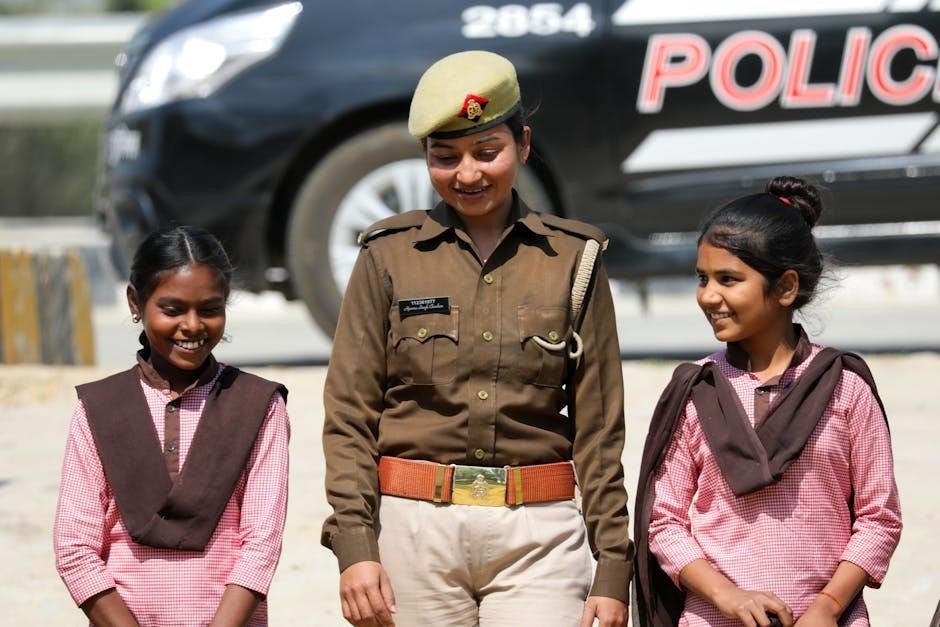A security officer ensures safety by patrolling premises, monitoring surveillance, and inspecting access points. They maintain order, respond to emergencies, and enforce rules to protect people and property.
1.1 Overview of the Role of a Security Officer
A security officer is responsible for maintaining safety and order by patrolling premises, monitoring surveillance systems, and inspecting access points. They ensure compliance with security protocols, respond to incidents, and provide assistance to personnel and visitors. Their role is critical in safeguarding people, property, and assets while upholding legal and ethical standards in their duties.
1.2 Importance of Security Officers in Maintaining Safety
Security officers play a vital role in maintaining safety by preventing theft, violence, and rule infractions. They effectively communicate suspicious activities to higher authorities, ensuring a secure environment for employees and visitors. Their presence deters potential threats and provides immediate response to emergencies, making them indispensable in protecting lives and property while maintaining order and compliance with safety regulations.
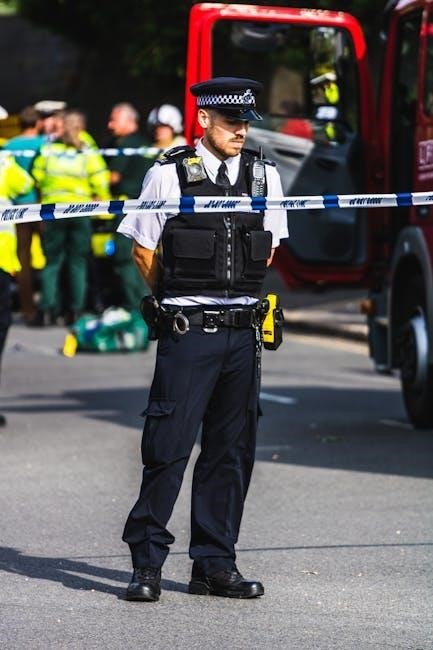
Key Duties of a Security Officer
Security officers patrol premises, monitor surveillance systems, and inspect access points to ensure safety and prevent unauthorized entry, maintaining a secure environment for employees and visitors.
2.1 Patrol Duties and Surveillance
Security officers conduct regular patrols of premises to detect and deter suspicious activities. They monitor surveillance cameras and equipment to ensure comprehensive coverage and respond to potential threats promptly. Effective surveillance helps prevent unauthorized access and maintains a safe environment for everyone on the premises.
2.2 Monitoring Security Systems and Equipment
Security officers monitor surveillance cameras, alarms, and access control systems to identify and address potential security breaches. They ensure all equipment operates efficiently, performing routine checks to maintain functionality. This proactive approach helps safeguard premises and personnel by providing real-time insights into security conditions.
2.3 Inspecting Facilities and Access Points
Security officers inspect buildings, equipment, and access points to ensure compliance with safety protocols. They check for potential vulnerabilities, unauthorized access, or damage, ensuring all areas remain secure. Regular inspections help prevent breaches and maintain a safe environment for personnel and visitors, addressing issues before they escalate.
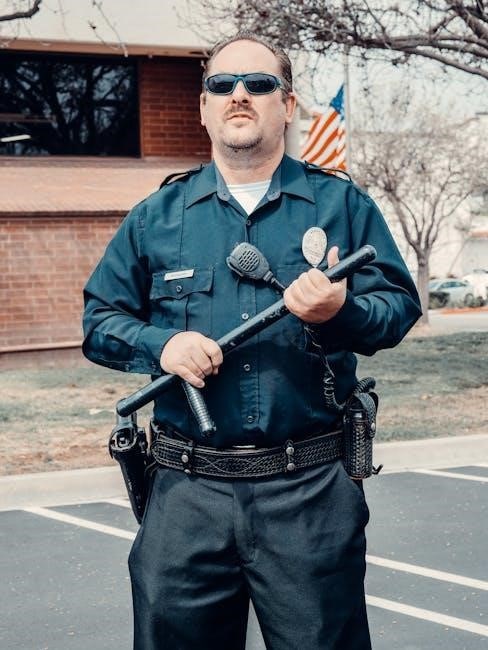
Responsibilities in Emergency Situations
Security officers respond to breaches, provide first aid, and coordinate with emergency services. They handle incidents, ensuring safety and minimizing risks during crises.
3.1 Responding to Security Breaches and Incidents
Security officers swiftly respond to breaches, assessing situations to prevent escalation. They secure areas, detain suspects when necessary, and ensure safety protocols are followed. Effective communication with emergency services and stakeholders is crucial to resolving incidents efficiently and maintaining order.
3.2 Providing First Aid and Emergency Assistance
Security officers provide immediate medical care and assistance in emergencies, such as injuries or sudden illnesses. They assess situations, stabilize conditions, and administer basic life support until professional help arrives. This includes CPR, wound care, or using automated external defibrillators. Their prompt actions help prevent minor incidents from escalating and ensure the well-being of individuals until further medical aid is available.
3.3 Coordinating with Law Enforcement and Emergency Services
Security officers collaborate with law enforcement and emergency services during incidents, ensuring effective communication and rapid response. They contact authorities when necessary, provide critical information, and assist in investigations. This coordination ensures compliance with legal procedures, supports public safety, and facilitates a swift resolution to emergencies, maintaining order and protecting individuals and property effectively.
Communication and Reporting
Security officers document incidents, prepare reports, and communicate findings to supervisors and stakeholders, ensuring transparency and accountability in maintaining safety and security protocols effectively.
4.1 Documenting Security Incidents and Activities
Security officers meticulously document incidents, recording details such as dates, times, locations, and outcomes. They prepare detailed reports and maintain activity logs, ensuring accuracy and timeliness. This documentation supports investigations, legal compliance, and incident reviews. Officers also update records with follow-up actions, fostering transparency and accountability in security operations. Accurate reporting aids in identifying patterns and improving future security strategies effectively.
4.2 Preparing Incident Reports and Logs
Security officers are responsible for preparing detailed incident reports and maintaining accurate logs. They gather information from witnesses, review surveillance footage, and document all relevant details. Reports include incident type, parties involved, actions taken, and outcomes. Logs are updated regularly to reflect ongoing activities and incidents. This documentation ensures accountability, supports investigations, and provides a clear record for future reference and analysis.
4.4 Communicating with Supervisors and Other Stakeholders
Security officers must maintain clear communication with supervisors and stakeholders. They provide regular updates on incidents, security status, and concerns. This ensures effective coordination and decision-making. Officers also receive feedback and instructions, fostering a collaborative environment. Timely and accurate communication helps address issues promptly, ensuring safety and efficiency while maintaining professionalism and transparency in all interactions.
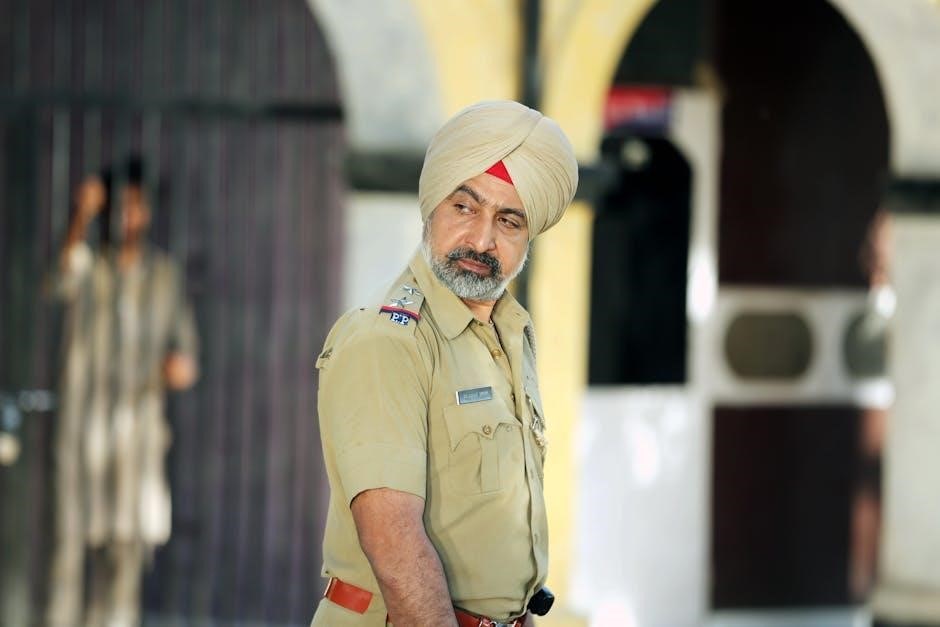
Legal and Compliance Responsibilities
Security officers must adhere to legal standards, ensuring compliance with regulations and protocols. They maintain confidentiality, avoid legal violations, and uphold ethical practices while safeguarding sensitive information.
5.1 Ensuring Compliance with Security Protocols and Regulations
Security officers must strictly adhere to established protocols and legal requirements, ensuring all actions align with company policies and regulatory standards. This includes conducting regular audits, maintaining proper documentation, and staying informed about updates to security laws and guidelines to uphold organizational integrity and safety standards effectively.
5.2 Understanding Legal Powers and Limitations
Security officers must understand their legal authority, including detention rights and access control. They cannot exceed police powers or violate privacy laws. Knowing these boundaries ensures lawful enforcement of security protocols, preventing personal or organizational liability. This understanding is crucial for maintaining professionalism and avoiding legal conflicts.
5.3 Maintaining Confidentiality and Data Protection
Security officers must safeguard sensitive information and ensure data protection. This includes securing access to records, avoiding unauthorized disclosure, and adhering to privacy laws. Proper handling of confidential materials prevents breaches and maintains trust in security operations, ensuring compliance with organizational policies and legal requirements for data security.
Supervision and Team Management
Security officers supervise personnel, manage shift schedules, and conduct training to ensure effective team operations and compliance with security protocols and procedures.
6.1 Supervising Security Personnel and Contractors
Security officers supervise in-house and contract personnel, monitoring their performance and ensuring adherence to protocols. They coordinate activities, address issues, and conduct investigations to maintain compliance and operational efficiency, ensuring a secure and organized environment for all stakeholders.
6.2 Conducting Training and Briefings for Security Staff
Security officers deliver training sessions and briefings to enhance staff skills and knowledge. They ensure compliance with protocols, discuss safety measures, and review emergency procedures to maintain a highly prepared and efficient security team capable of handling various situations effectively.
6.3 Managing Shift Schedules and Work Assignments
Security officers oversee shift scheduling and task delegation, ensuring adequate coverage and resource allocation. They coordinate rotations, monitor attendance, and adjust assignments to meet operational needs, maintaining efficient security operations and ensuring all posts are manned appropriately at all times.
Customer Service and Public Interaction
Security officers assist visitors and employees, handle complaints, and resolve conflicts professionally. They maintain a positive public image by providing helpful, courteous, and respectful service.
7.1 Providing Assistance to Visitors and Employees
Security officers assist visitors and employees by directing them, answering inquiries, and addressing concerns. They ensure smooth access and provide support, maintaining a helpful and approachable demeanor to foster a secure and welcoming environment. Their role includes guiding individuals, managing access points, and resolving minor issues promptly to ensure operational efficiency and safety. This enhances overall satisfaction and safety.
7.2 Handling Complaints and Resolving Conflicts
Security officers handle complaints by investigating incidents, mediating conflicts, and ensuring fair resolutions. They remain composed, addressing concerns promptly to de-escalate tensions and maintain order. Effective communication and problem-solving skills are essential to resolve disputes while upholding safety and respect for all parties involved, ensuring a harmonious environment for visitors and employees alike.
7.3 Maintaining a Positive Public Image
Security officers foster a positive public image by providing courteous assistance, addressing concerns, and behaving professionally. Their visible presence and proactive approach enhance trust, creating a safe and welcoming environment. By maintaining a respectful and approachable demeanor, they contribute to the organization’s reputation and ensure public confidence in security operations and overall safety measures.
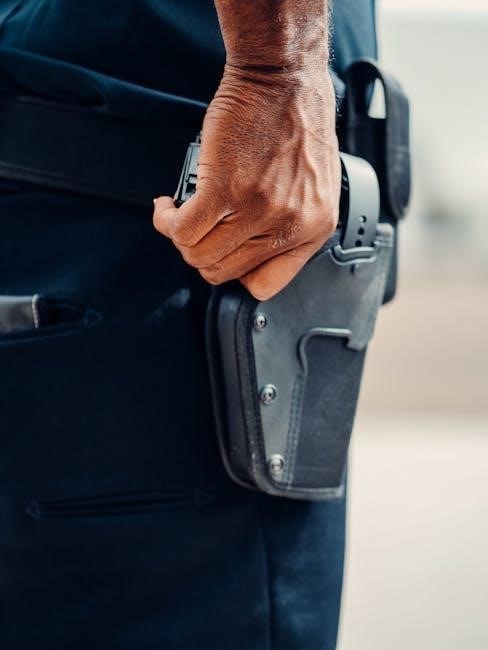
Specialized Roles and Responsibilities
Security officers may specialize in roles like armed security, senior supervision, or event management. Armed officers handle firearms, while seniors oversee teams and operations. Special events require crowd control expertise, ensuring safety and order during large gatherings or high-risk situations, adapting their duties to meet unique security challenges and maintaining professionalism in diverse scenarios.
8.1 Duties of Armed Security Officers
Armed security officers are trained to handle firearms and high-risk situations. Their primary duties include protecting sensitive areas, responding to armed threats, and ensuring safety protocols are followed. They must maintain firearm proficiency, monitor access points, and collaborate with law enforcement during emergencies. Armed officers also conduct thorough inspections and remain vigilant to prevent potential security breaches, ensuring a secure environment for all personnel and assets.
8.2 Responsibilities of Senior Security Officers
Senior security officers oversee teams, ensuring compliance with protocols and managing incidents. They supervise personnel, handle complaints, and coordinate with law enforcement. Responsibilities include training, scheduling, and enforcing safety measures. They also investigate breaches, maintain equipment, and develop strategies to enhance security. Senior officers must remain updated on best practices to lead effectively and ensure a secure environment for all stakeholders.
8.3 Special Event Security and Crowd Control
Security officers manage event security by planning and executing safety measures. They assess risks, monitor access points, and implement crowd control strategies. Responsibilities include coordinating with law enforcement, managing emergencies, and ensuring compliance with safety protocols. Officers maintain visibility to deter incidents and provide assistance, while also managing large groups to prevent overcrowding and ensure orderly movement during events.
Professional Development and Ethics
Security officers must maintain professional conduct, uphold ethical standards, and engage in continuous learning. They adhere to integrity, ensuring trustworthy performance of duties while respecting confidentiality and legal boundaries.
9.1 Maintaining Professional Conduct and Integrity
Maintaining professional conduct and integrity involves adhering to ethical standards, upholding honesty, and avoiding conflicts of interest; Security officers must stay impartial, respect privacy, and avoid any actions that could compromise their trustworthiness or the organization’s reputation. This ensures reliable and fair execution of duties, fostering a safe and secure environment for all stakeholders.
9.2 Staying Updated with Security Best Practices
Security officers must continuously update their knowledge of industry standards and emerging threats. Engaging in training, attending briefings, and participating in workshops ensures they adopt proven strategies. Staying informed about technological advancements, legal changes, and new protocols helps them perform effectively, protecting people and assets while maintaining compliance with current security regulations and practices.
9.3 Adhering to Ethical Standards in Security Operations
Security officers must uphold ethical standards, ensuring impartial and respectful conduct. They should avoid conflicts of interest, maintain confidentiality, and respect privacy. Ethical behavior builds trust and integrity, essential for effective security operations. Adherence to professional codes of conduct ensures that duties are performed lawfully and morally, fostering a safe and just environment for all individuals involved.

